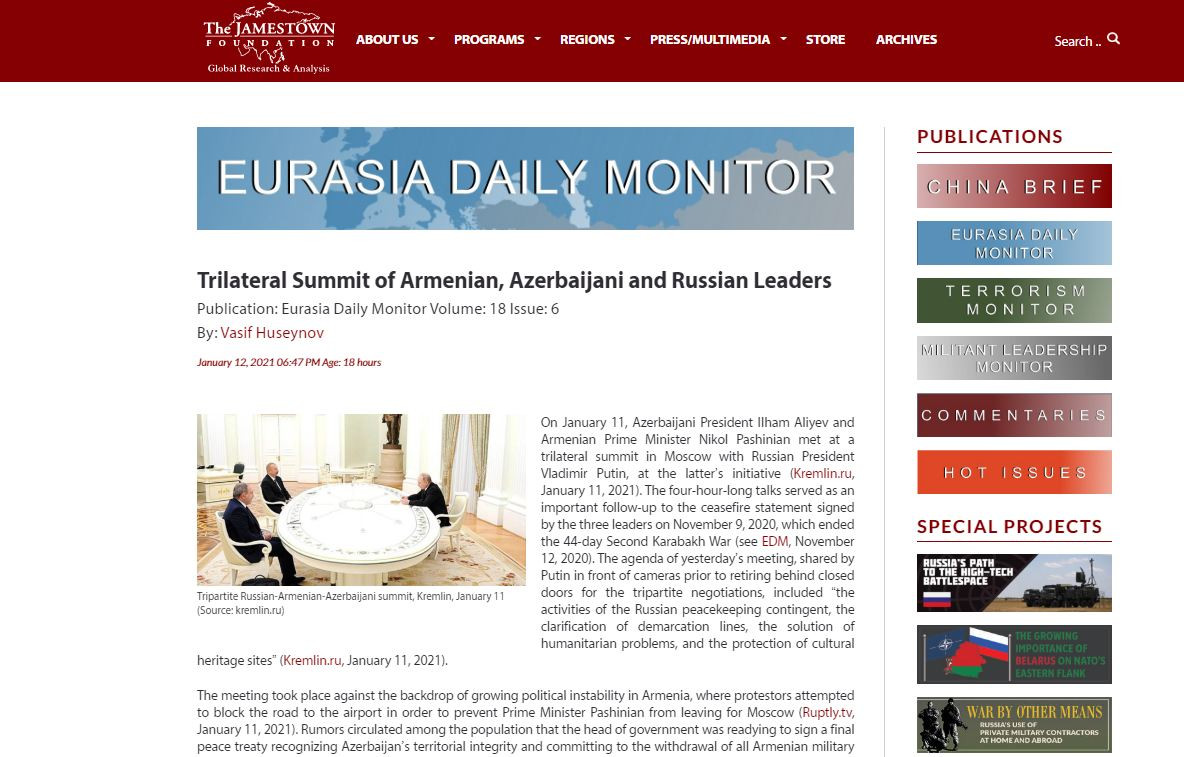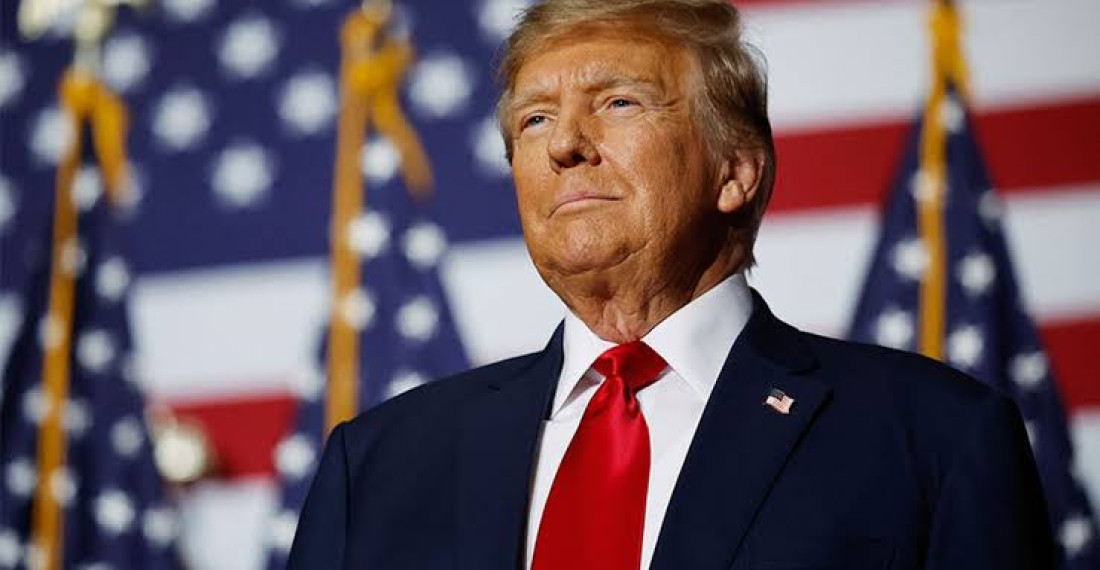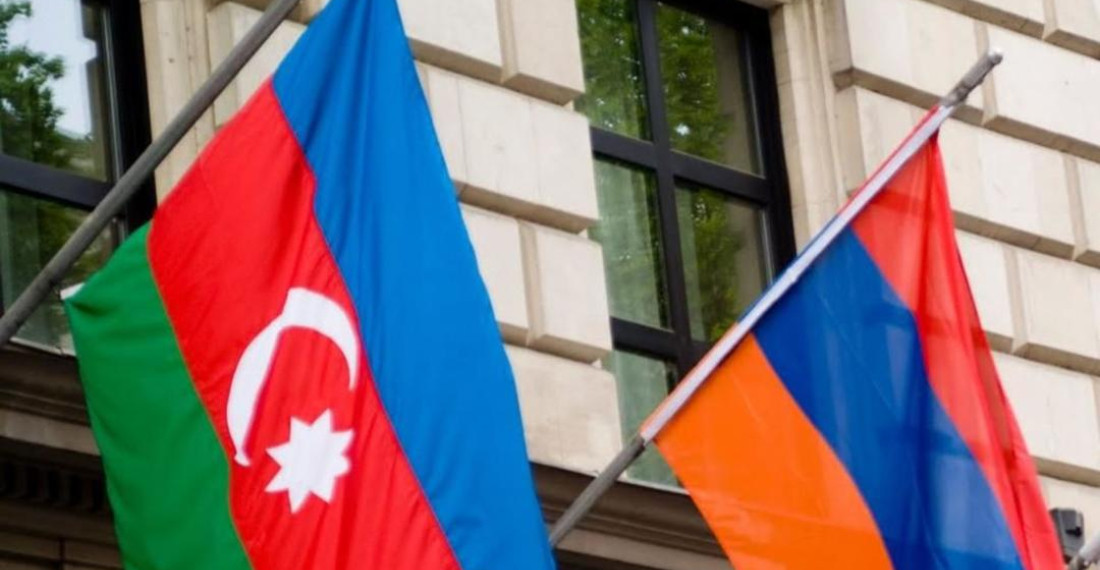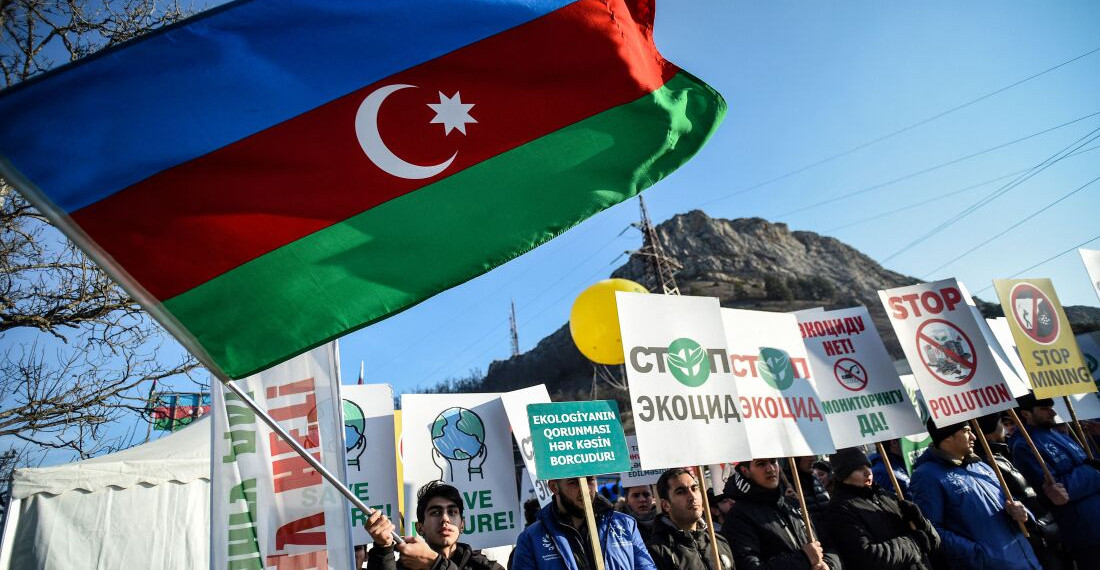On January 11, Azerbaijani President Ilham Aliyev and Armenian Prime Minister Nikol Pashinian met at a trilateral summit in Moscow with Russian President Vladimir Putin, at the latter’s initiative (Kremlin.ru, January 11, 2021). The four-hour-long talks served as an important follow-up to the ceasefire statement signed by the three leaders on November 9, 2020, which ended the 44-day Second Karabakh War (see EDM, November 12, 2020). The agenda of yesterday’s meeting, shared by Putin in front of cameras prior to retiring behind closed doors for the tripartite negotiations, included “the activities of the Russian peacekeeping contingent, the clarification of demarcation lines, the solution of humanitarian problems, and the protection of cultural heritage sites” (Kremlin.ru, January 11, 2021).
The meeting took place against the backdrop of growing political instability in Armenia, where protestors attempted to block the road to the airport in order to prevent Prime Minister Pashinian from leaving for Moscow (Ruptly.tv, January 11, 2021). Rumors circulated among the population that the head of government was readying to sign a final peace treaty recognizing Azerbaijan’s territorial integrity and committing to the withdrawal of all Armenian military forces from Karabakh. This was categorically denied by the prime minister’s spokesperson, Mane Govorgyan. She emphasized that no document was planned to be signed on the settlement of the Karabakh conflict or any territorial matter, adding that, for Armenia, “the issue of the return of the captives, the search for the bodies of the victims, the fate of the missing are crucial” and, without a settlement on this, it would be “extremely difficult” to negotiate over other questions (Armradio.am, January 10, 2021).
In particular, the Armenian official was referring to captives detained by Azerbaijan after the end of the war. In a letter addressed to United Nations Secretary General Antonio Guterres and dated December 28, 2020, Azerbaijan’s Foreign Minister Jeyhun Bayramov announced that 62 Armenians had been taken prisoner in an “anti-terror operation” conducted in areas “recently liberated from occupation” since the end of the Second Karabakh War (Undocs.org, December 28, 2020). Referring to those apprehended individuals as members of “subversive groups,” Baku asserts that their status is not covered by the trilateral statement of November 9, which called for the exchange of prisoners of war, hostages and other detained persons, and dead bodies (President.az, November 10, 2020). In his address before the Moscow meeting, President Putin signaled that the issue regarding the captives is considered resolved by the Russian side as well, saying, “With the mediation of Russia, the exchange of prisoners and the bodies of the dead was carried out,” and it would be important now to outline the next steps envisioned by the November 9 statement (Kremlin.ru, January 11, 2021).
Yesterday’s Putin-Aliyev-Pashinian summit concluded with the signing of another document that primarily built upon the ninth article of the November 9 trilateral statement (i.e., the restoration of all economic and transport links and development of infrastructure projects in the region) (President.az, January 11, 2021). The new, four-article document declared the creation of a working group co-chaired by deputy prime ministers of the Republic of Azerbaijan and the Republic of Armenia as well as the deputy chairperson of the government of the Russian Federation. The working group is supposed to ensure the implementation of Article 9 of last year’s ceasefire statement and submit a list of activities and their implementation schedule for approval at the highest level by the three states before March 1. The joint concluding statement of the Moscow summit declares establishing railway and automobile communication as a priority and seeks to ensure international shipping across Azerbaijan and Armenia as well as cargo transit by the two countries across each other’s territories.
Thus, in contrast to the expectations of the Armenian side, the meeting did not deliver any outcome about the fate of the captives. Nor was there any accord about the legal mandate of Russian peacekeepers deployed to Karabakh in line with the November 9 trilateral agreement. The fact that there is no legal framework adopted to regulate the activities of the peacekeepers has grown into a major concern for Azerbaijani society—especially following a handful of controversial or provocative incidents involving Russia over the last two months since the ceasefire (Jam-news, December 14, 2020). Overall, the January 11 summit left the resolution of many other issues regarding the conflict to the future. This includes, primarily, questions about the portion of the Karabakh region under the joint control of Armenians and Russian peacekeepers.
Continued disagreement about the unresolved topics was noticed also during the three leaders’ post-negotiations press conference. President Aliyev, referring also to previous statements of his Russian counterpart, declared that “the Nagorno-Karabakh conflict has been consigned to history and we must think about the future, how to live together as neighbors, how to work to open transportation arteries and strengthen regional stability and security” (President.az, January 11, 2021)
But Armenian Prime Minister Pashinian retorted that, “Unfortunately, this conflict has not been resolved yet. The conflict remains. Of course, we have managed to ensure a ceasefire, but there are still many issues to be resolved,” specifically adding “One of these issues is the status of Nagorno-Karabakh.” Unlike the other two leaders, who either did not mention or underplayed the role of the Organization for Security and Cooperation in Europe’s (OSCE) Minsk Group in the current phase of the conflict, Pashinian explicitly underscored Yerevan’s readiness to “continue talks on this issue within the framework of the OSCE Minsk Group co-chairs.” Nevertheless, he joined his colleagues in declaring that the implementation of the January 11 statement “can simply change the economic landscape and image of our region” (President.az, January 11, 2021).
https://jamestown.org/program/trilateral-summit-of-armenian-azerbaijani-and-russian-leaders/








